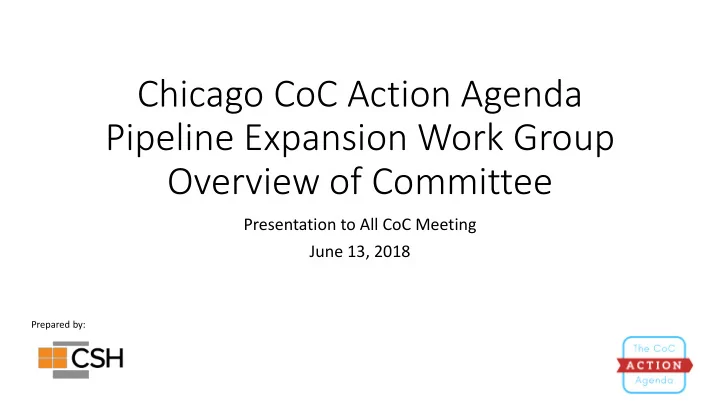

Chicago CoC Action Agenda Pipeline Expansion Work Group Overview of Committee Presentation to All CoC Meeting June 13, 2018 Prepared by:
Pipeline Expansion Work Group Process Use data to inform type and scale of resources Build system capacity and Advance unit Homeless single • connect to creation adults, families, other strategies parenting youth strategies and young adults Imminent Risk of • Homelessness Manage Finalize pipeline and financial tie to system modeling performance
Pipeline Expansion Work Group Members Housing Homeless Services Developers, People with Lived Government and Supportive Intermediaries, Experience Partners Housing Providers and Advocates Corporation for Supportive Chicago Housing Sarah’s Circle Housing Authority Lived Experience Heartland Housing Deborah’s Place Commission Department of Family and Support Services Enterprise Community Matthew House Partners Department of Planning and Development Community Investment UCAN Corporation Illinois Housing Unity Parenting and Development Authority All Chicago Next Steps, NFP Counseling Chicago Coalition for the Mayor’s Office Inner Voice Homeless
Outlining the Need: Data Framework Data sources are annually-reported public data from Homeless Management Information Systems Layer real-time data on housing assessments through Coordinated Entry System and Dashboard to End Homelessness Projections are directionally appropriate at a scale and proportion that will support larger system change and drive impact to reduce and end homelessness Future housing projections will focus on households who are at imminent risk of homelessness so that we can deliver all interventions without bringing people into shelter
Homelessness=Housing: Moving the Needle Requires Housing Investments (example of system performance measures) • Pipeline Expansion will support System Performance Measures • End chronic homelessness for Veterans by 12/31/18 • Reduce chronic homelessness by 25%. • All units are filled through coordinated entry. • Reduce street homelessness by 25% by 2020 • Reduce the number of youth experiencing homelessness by 25%. • Reduce the number of families experiencing homelessness by 25%. • Documenting system impact requires that housing resources take from Coordinated Entry, which ties back to the Homeless Management Information System to track permanent housing exits, recidivism, inflow, and overall change
Housing Creation Strategies and Timeframe • Secure unit commitments from funding agencies (CHA, City of Chicago, IHDA, other) • Homeless preferences • Set-aside unit commitments • Apply for federal resources to direct to homelessness • Realistically new units won’t begin to be realized until 2019 • Release coordinated funding applications that recruit projects to meet system needs and system goals
Pipeline Expansion Depends on and Informs other Lines of Work Crisis CES Employment Response Diversion Targeting Income for All Access to Rightsizing Matching Mainstream Employment
What’s Next? • Presentation to CoC Board on Unit Commitments • Financial Modeling • Integrate with City’s 5-year Affordable Housing Plan • Housing Creation Strategies • System Capacity Building • Policy and Advocacy for Resources and Development Policies • Monitor Pipeline
Recommend
More recommend